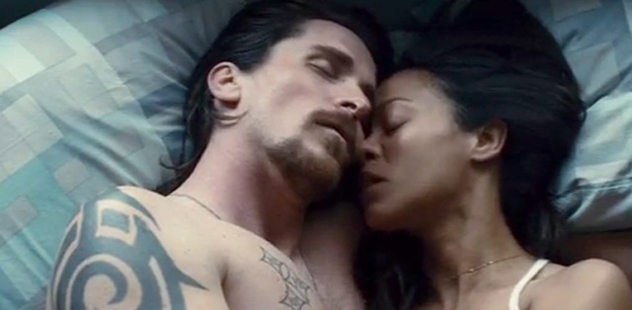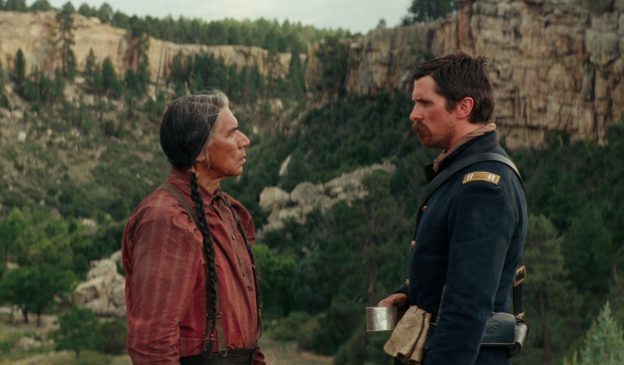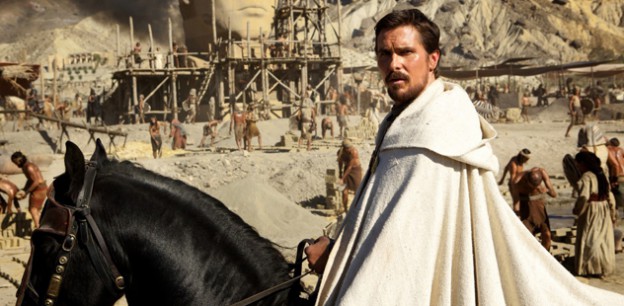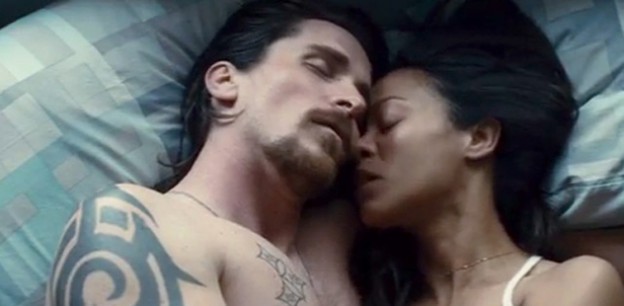Hostiles is such a complicated film, though I guess I should have expected as much from anything starring Christian Bale and directed by Scott Cooper (Black Mass). You can imagine how exciting something like this would sound in a pitch meeting, too: A Western—which is the hallmark of American grit and one-sided, hard-talk bad-assery—that centers on something as tender and intellectually important as overcoming bigotry through brutal adversity. Putting sworn enemies together and forcing them into a common goal makes for the most engaging kind of conflict, and there are moments in Hostiles that fulfill that promise, but there are other parts that are clunky and heavy-handed to the point of being hard to follow.
Interestingly, the film positions itself in a way that complicates the moral binaries of traditional Westerns. There are no “good guys” and “bad guys” in Cooper’s film, which makes for a nuanced and more historically accurate view of a savage and barbarous time in American history. As a result, both the nuance and savagery are left to unfold in interesting ways. Where the politics of the film fall short are in not humanizing these archetypes and exploring the subtleties of the dynamics a little more.
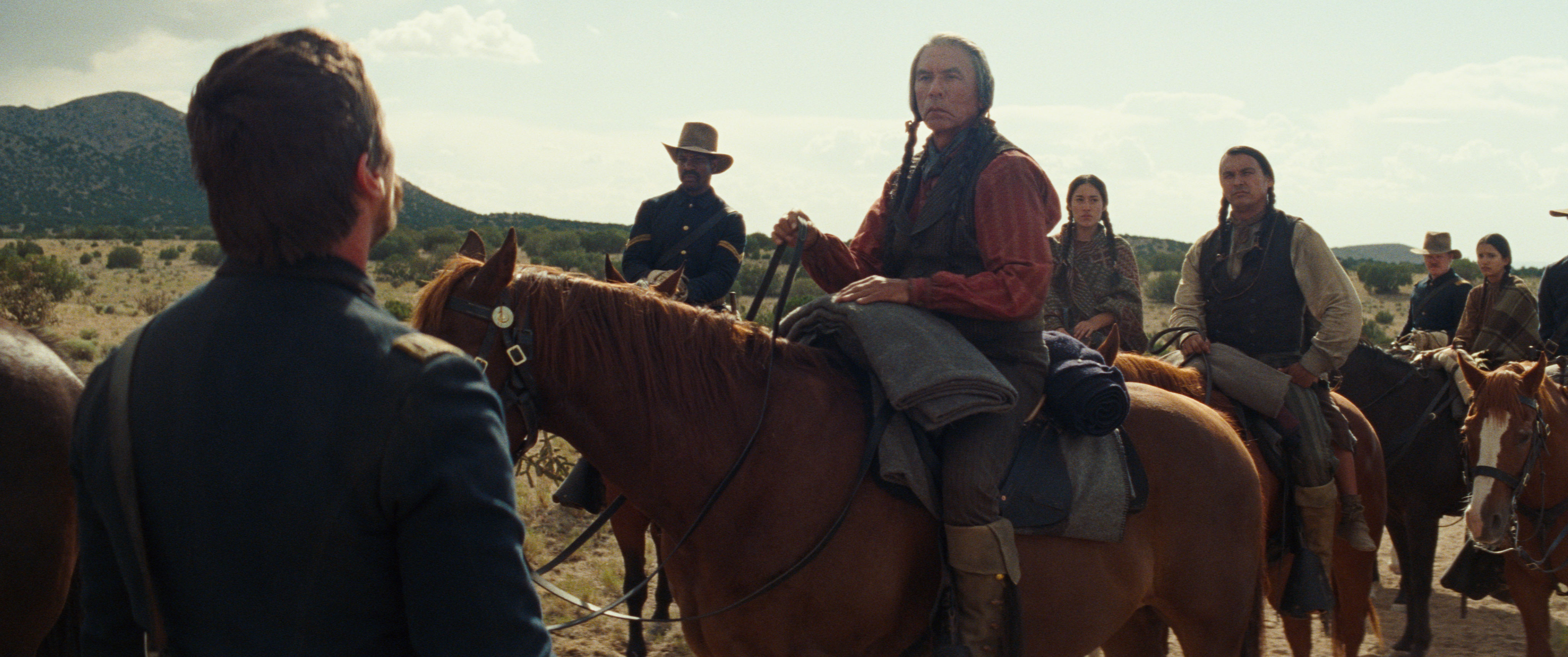
Hostiles follows U.S. Army Captain Joseph J. Blocker (Bale), who has a reputation for being a ferocious killer of Native People, as he is forced to escort his dying enemy, Cheyenne chief Yellow Hawk (played by Wes Studi) from New Mexico to Montana Territory, so that he can die on tribal lands. Blocker hates the task, and loathes the Cheyenne chief so much that he contemplates suicide to keep Yellow Hawk from a noble burial. Overcome with a sense of duty that only a 19th century U.S. Army Captain can understand, he relents and forms a small band of fellow deplorables—including Timothée Chalamet as Private Philippe DeJardin and Jesse Plemons as Lieutenant Rudy Kidder—to escort Yellow Hawk and his family home to die.
Structurally, this is—if you squint—a Western that gets off of the hook of tired “cowboy and indian” stories by complicating the genre and masquerading as a road movie. As such, it leaps out of the frying pan and into the fire by tripping over all of the worn out road movie tropes. But it’s in exploring the biggest road movie trope of all (meeting the curious stranger who needs help) that this film starts functioning on a deeper emotional level, as the procession comes across Rosalie Quaid (played by Rosamund Pike), a widow who has just seen her husband and three children slaughtered by Comanches. Broken and suicidal, Rosalie is the emotional heart of the film and the barometer for change. And here’s where the politics of the film get a little murky.
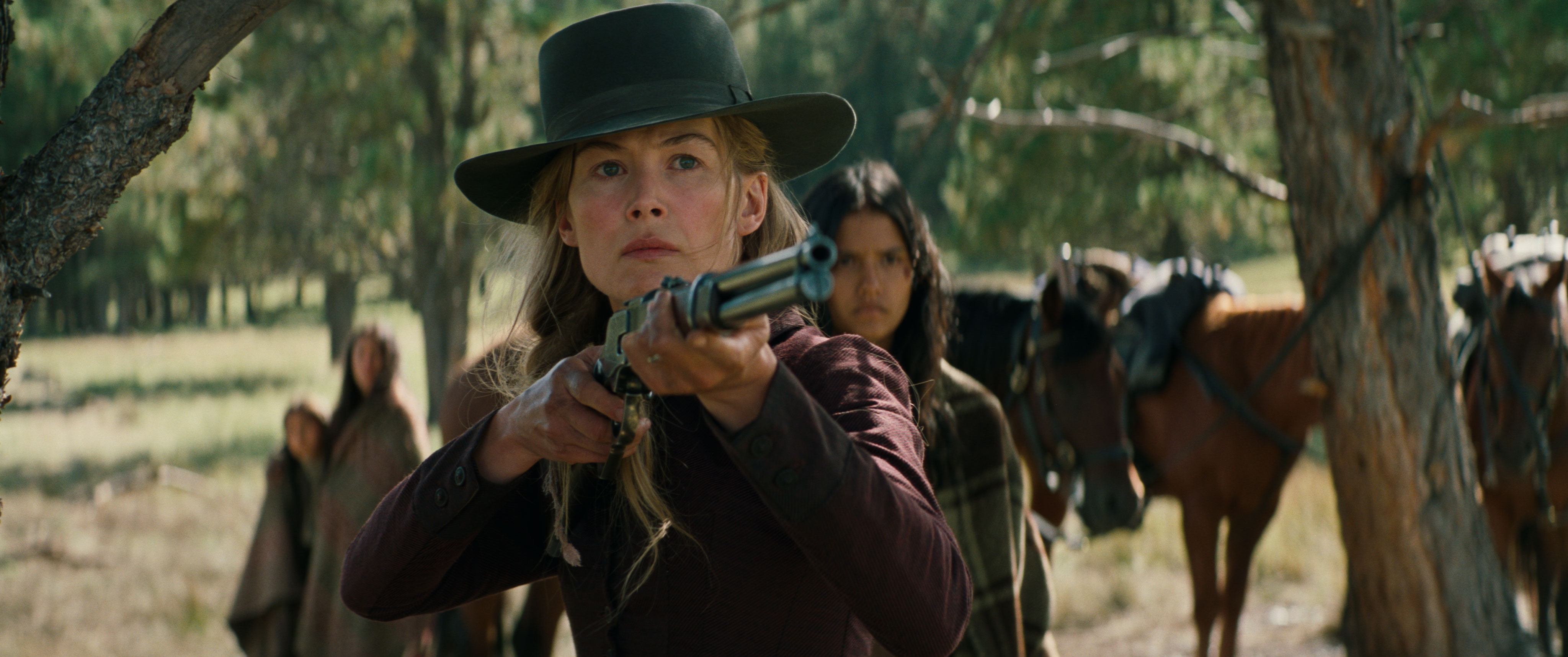
While the plausibility of seeing your family murdered in front of you making you skeptical of the people who share a complexion with the assailants plays well on the screen, it ends up reducing the native characters to either murderous savages (the Comanche) or sentimental philosophers (Yellow Hawk and the Cheyenne), and the truth is that for a film hell-bent on breaking down the genre, it’s hugely irresponsible to mishandle one of the biggest misgivings in the Western genre. And while we get to watch Rosalie change, in moments that are both compelling and emotional, that change doesn’t come from a nuanced understanding of Native People, or a sense of compassion that is sprung from witnessing the treatment of Native People, but rather from a logistical change, the catalyst of which is mostly grounded in the fact that they share a common enemy in the Comanche. Roll your eyes with me.
While the film really does good work in depicting the complicated relationships on the frontier in the 19th century, it leaves a lot to be desired in terms of exploring or scrutinizing these characters. At some point in the development, Hostiles—which is based on a story by Donald E. Stewart—was being considered as a True Detective-like anthology drama, which would have given it the time and space to delve deep into these captivating characters and relationships. One hundred thirty-three minutes isn’t enough time to do that, and the result is a film that, for all its elaborate bombast, interesting characters, wonderful cinematography and delightful acting performances, tries hard, but falls a little flat.
{3 out of 5 stars}
**This review first appeared in print on page 29 of issue #258 (Jan. 29 – Feb. 12, 2018)**
Exodus: Gods and Kings
PG-13 {1.5 out of 5 stars}
Bible stories. You know you’ve been waiting for them. And guess what? They’re here, and some of them star Russell Crowe! Let me just reassure you that there’s nothing wrong with fantasizing about Dwayne Johnson as Goliath in the next James Cameron film. David vs. Goliath is a Bible story, right?
I don’t really remember. Like many, I went to Sunday school as a kid but was ultimately unaffected. I harbor no ill will toward Christianity, though no particular reverence either. I feel perfectly capable of looking at a movie like Exodus: Gods and Kings, and reviewing it without bias. Because when you get right down to it, the Bible is full of amazing stories (whether or not there’s any truth to them is a conversation for another time between people who actually care about such things). But at the very least, the Bible is a treasure trove of allegory and adventure, and it makes perfect sense that Hollywood would begin turning more and more of its tales into major motion pictures.
Exodus: Gods and Kings is the story of Moses. Driven out of Egypt by Pharaoh Ramses after the revelation of his Hebrew roots, Moses defies exile by leading 600,000 Hebrew slaves from their collective shackles under the guise of Almighty God. Christian Bale portrays the man of the hour, leading a relatively star-studded cast that includes Ben Kingsley, Joel Edgerton, John Turturro, Aaron Paul and of course (being that this is a Ridley Scott film) Sigourney Weaver. Seemingly all the necessary ingredients are at hand for a massive epic, and clocking in at 150 minutes, you’d have to believe that Scott felt the same.
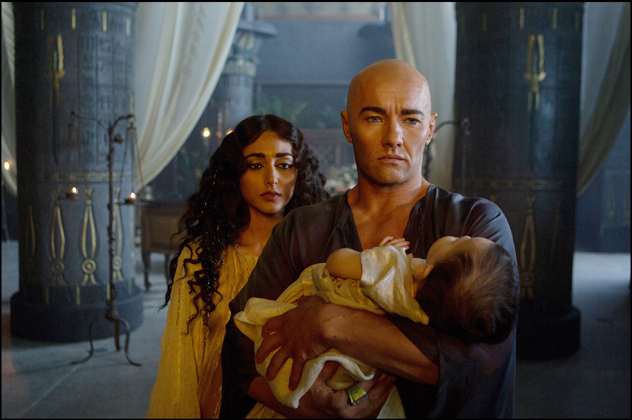
But, simply put, Exodus is boring. No. It’s a horse tranquilizer. Other words that might describe its aspect would be stale, milquetoast and overreaching. Let us now evaluate each word above and its applicable nature.
Boring: Good Lord does this film plod. Long stretches of uninteresting dialogue wrapped in a cloak of Biblical history has a way of wearing one down after a while. And by “a while” I mean about three minutes.
Stale: The acting is lifeless. Joel Edgerton’s portrayal of Pharaoh Ramses couldn’t possibly be less intriguing, and the same can pretty much be said for the lot of ‘em. (When John Turturro is flat-out invisible in a character role, you know there’s something wrong.) And you’d also think that recreating Egypt BCE would equal somewhat of a visual thrill, but again, you’d be wrong. It’s like Moses went to Modesto.
Milquetoast: Difficulty catching five winks in your busy schedule? Try the Exodus action sequences on for size. They’re so spineless, at one point I actually thought the poor soul next to me was taking a nap with his eyes open.
Overreaching: As someone who doesn’t know how many pages in the Bible are actually dedicated to the story of Moses, I can only reflect on what the film has to offer. And what it does offer is a setup far too grand for a payoff far too small. No Charlton Heston moment here.
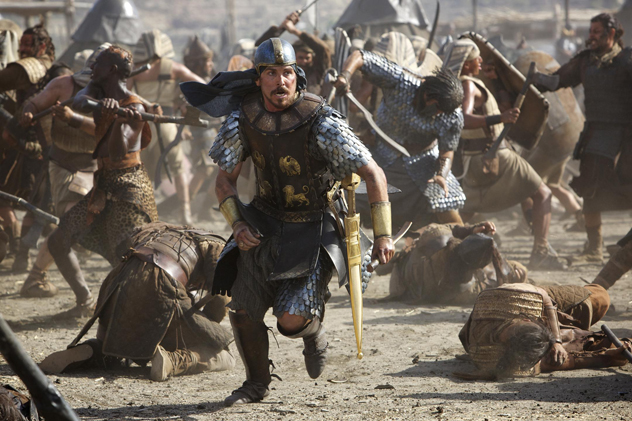
In other news, I’ve heard some criticism regarding the film’s casting and its general lack of Eastern faces. Moses certainly didn’t look anything like Christian Bale, that’s for sure. But this is par for the course, and follows a long-standing tradition of cinematic opuses that reads like the 11th Commandment: “When in doubt, cast white people and give them British accents.” You’re also sure to hear critiques on the film’s historical accuracy, which to me is laughable, as it is in all likelihood a made-up story in the first place. Though I suppose if you really do believe the Bible word for word, you’ll find something legitimate to take umbrage with, just as I do with, say, The Rum Diary.
I feel comfortable saying that there are worse movies than Exodus: Gods and Kings. It’s not repellent, it’s just not any damn good. I kept thinking how much it reminded me of Kingdom of Heaven, which I later realized is also directed by Ridley Scott. It’s possible that if you’re a practicing Christian, you’ll find a smattering of interest here. But religion should not mask the fact that this is just a dull, forgettable film.
Out of the Furnace
Rated R
When I lay my head down on the pillow each night, there are only two things I wish for. The first is to meet and marry the woman of my dreams and have seven children that all grow up to be Olympians, senators, longshoremen, cattle rustlers, rum-runners, drag queens and Chamber of Commerce members. The second is more Woody Harrelson. Honest to Christ, is there a more underrated actor in all of Hollywood? I eagerly await the day True Detective debuts on HBO so I can get my weekly Woody. (Jesus did I say that? Or just think it?)
Director Scott Cooper must hold similar sentiments, as he opens his latest—the grey-skied Rust Belt drama Out of the Furnace—with the man of the hour front and center. Harrelson plays Harlan DeGroat, a savage, bare-knuckle kingpin of the New Jersey backwoods, and announces his presence at a drive-in movie theater with a classic villainous introduction that immediately forces the audience to hate everything about his very being (reminiscent of Denzel’s introductory scene at the diner in Training Day). We are quickly transported to North Braddock, Pennsylvania, a dreary steel town in Allegheny County where Russell Baze (Christian Bale) leads a typical, if not content, millworker’s life. He has a troubled G.I. brother up to his eyes in the wrong kind of debt (Casey Affleck), a girlfriend longing for pregnancy (Zoe Saldana) and a father dying of cancer, watched over by a loving uncle (Sam Shepard).
Russell looks out for his brother, Rodney, best he can, paying forward to John Petty (Willem Dafoe), the seedy but good-hearted bar owner/back-alley fight promoter that just can’t seem to get the prideful Rodney to take a dive for the sake of evening the score. But Russell’s world is turned upside-down when he careens his truck into the back of a station wagon while under the influence, killing a mother and child. He’s sent to prison, whereupon he misses the death of his father, in addition to his girlfriend leaving him for a local cop (Forest Whitaker).
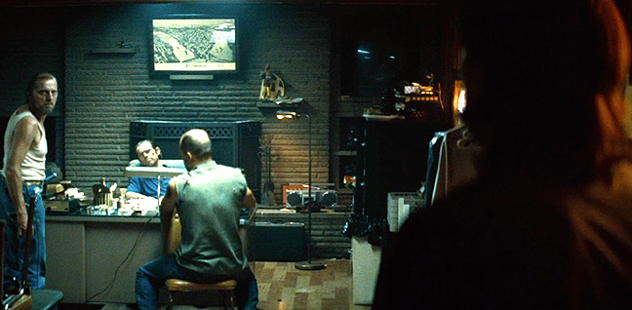
As you might have gleaned, Out of the Furnace is not a particularly uplifting film. It strives from the outset for a tone of drab melancholy, depicting bemused yet sympathetic characters. The plot is slow to materialize, which at times is frustrating, but the beautifully smoky and grim Rust Belt scenery often stands firm in the plot’s rightful place. Make no mistake, though; it is a misstep that by the time Russell is released from prison, a good portion of the film has passed and we’re still without any real notion of where anything is headed. But where Killing Me Softly and The Counselor fell flat on their faces in this same predicament, Out of the Furnace gets by with its utter lack of pretension. There is no attempt whatsoever at conveying any sort of pseudo-philosophical bullshit, nor is there anything slick or sleek about the characters themselves. They’re gritty and bare bones, which is to say there is not one instance of Brad Pitt eating a cheeseburger in a leather coat.
Eventually Rodney pushes John Petty against his better judgment and into booking him a fight in the Ramapo Mountains of Appalachian New Jersey, where our underutilized villain resides as king hillbilly. In what probably marks the zenith of the film via interpolation of brutal fist fighting and deer hunting, the trip proves disastrous just as foreseen, leaving both Petty and Rodney dead. Back home in North Braddock, the wheels of justice are seemingly slow to turn due to state lines and the backwoods secrecy of the Ramapo hill people. This leads Russell down the inevitable path of taking matters into his own hands, walking the viewers down a stretch of misguided and somewhat uninteresting cat and mouse play between him and DeGroat. We’re led to a climax that is something less than climatic, which, when considering the film’s general deliberation, is not altogether surprising.
When all is said and done, Out of the Furnace is a flawed success. A character-driven drama lacking in substance, superbly acted and gloriously shot amid some of America’s most unsung natural beauty. In looking to bookend this review with ruminations on Woody Harrelson (which might as well be applied to all thoughts in life), his sterling performance of Harlan DeGroat serves as a euphemism for pretty much the entire film in that it’s both brilliant and underdeveloped. Out of the Furnace will likely leave you with that feeling of a near miss, though sometimes being near is still close enough.
